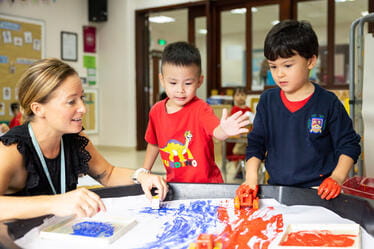Developing 21st Century skills and attitudes At BIS Hanoi, we think and talk a lot about preparing our students for the future. In a rapidly changing world, it can be challenging to try to predict what that future might look like, but what we do know is that our students will need to be true global citizens, able to appreciate the views of others and show empathy, in a proactive manner, if we are to hope to improve our world.
At BIS Hanoi, we think and talk a lot about preparing our students for the future. In a rapidly changing world, it can be challenging to try to predict what that future might look like, but what we do know is that our students will need to be true global citizens, able to appreciate the views of others and show empathy, in a proactive manner, if we are to hope to improve our world.
Nord Anglia Education South East Asia Model United Nations Conference
Last weekend, a group of students from Year 9 to Year 12 participated in the Nord Anglia Education South East Asia Model United Nations Conference, hosted by our sister school, BIS, Ho Chi Minh City. Other schools taking part were BVIS HCMC; Dover Court, Singapore; Regents Pattaya and BIS Abu Dhabi.
Through these MUN conferences, students are able to develop and practice their debate skills, critical thinking, and collaboration skills, as well as having the opportunity to look at a global issue from different perspectives.
The theme of the conference was Sustainable Solutions, and it comprised of four committees - UNESCO, The Environmental Commission, The Human Rights Council, and the UN General Assembly itself. The key topics which students were asked to debate were: the bioethical implications of gene editing; prevention of antibiotic resistance and resulting global pandemics; the militarisation of space; and addressing the issue of child migrants and their rights to citizenship.
Students from BIS Hanoi were active in all committees; they played a major role in the development and passing of multiple resolutions addressing a number of these global issues. For example, Ji Min Seo and Tue Nhi Nguyen, acting as Malaysia and Senegal, were co-submitters of separate resolutions in the UNESCO debate. In the General Assembly, Kanta Fujimoto, as Bangladesh, co-submitted a resolution addressing nationalist extremism and violence.
BIS students collaborated with students from other schools to pass resolutions. We were very proud that all of our participants were actively involved in all debates. Our students gave many speeches and contributed significant amendments to resolutions. Their impressive contributions were recognised in a number of awards for our delegates, including the coveted ‘Funniest Delegate’ for Hoang Nam Le. Special congratulations go to Heidi Seo, who won the overall ‘Best Delegate’ for the conference.
My thanks to Mr. Simon Hoare and Ms. Janet Oosthuysen for supporting our students with this event.
Celebrating International Women’s Day
International Women’s Day is another global example of ways in which we need to recognise and value the contributions of all members of society. For many generations, arguably, women have not been treated as equals to their male peers and have had to struggle for recognition and fairness. International Women’s Day tries to address these issues whilst also celebrating the contribution that women make to society in so many ways.
This week, the Secondary school have been focusing on promoting women’s rights and celebrating strong female role models. All week there have been activities for students shared through the morning daily briefing. They have addressed issues such as gender bias and stereotypes, and celebrated women who have made remarkable achievements.
This culminated in today’s Secondary assembly where Mr. Tim Webb, Head of Secondary, shared a reflection on International Women’s Day, with our Key Stage 3 and 4 students. Mr Webb emphasised the importance of recognising the public achievements of women like Kamala Harris and Jacinda Ahern. He also drew our school’s attention to the ongoing struggle to remove barriers to the achievement of women, globally. Representation (voice), reproduction (choice) and violence against women (safety) are issues with which every student, regardless of gender must engage. International Women’s Day and the assembly were a timely reminder of the successes of women to date and of the need for more effort from everyone to ensure that global citizens enjoy representation, safety and choice in the future, regardless of gender.
These are just two examples of ways in which we are preparing our students to live in a rapidly changing world, by raising their awareness of global issues and helping them to think of ways in which they can start to make a difference.



